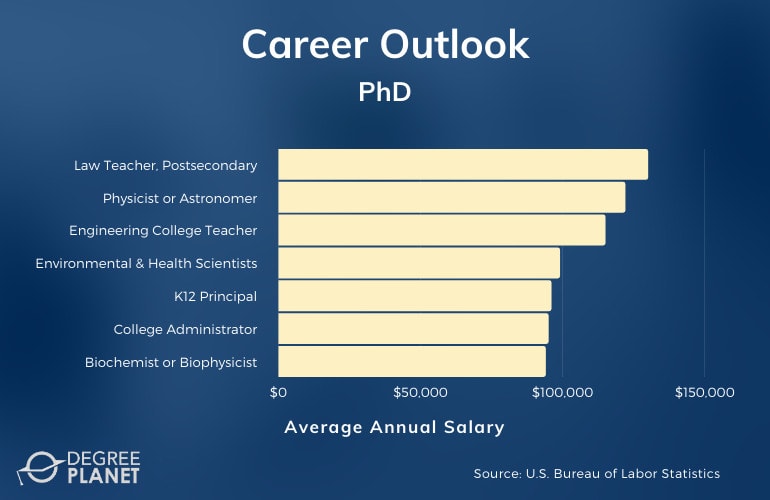Is a PhD worth it? How you answer may depend on your definition of rewards. The title “Ph.D.” means “doctor in philosophy” or simply “authority in learning.” In other words, the title, dating back to the middle ages, was not specific to the branch of study we now know as “philosophy.”

Today, a PhD can be obtained in just about any field…but it still involves “philosophy”—a “love of knowledge.”
Editorial Listing ShortCode:
When considering whether or not this is what you want, the intangible pleasures associated with lifelong learning and academic inquiry may be a big part of your calculation, alongside the more earthly rewards commonly referred to as jobs and salaries!
Is a PhD Worth It?

Yes, a PhD is worth it for many students. With evidence of increased job security overall — the Bureau of Labor Statistics projecting 5% job growth in education, training, and library occupations over the next 10 years, there are some real pragmatic reasons getting a PhD might be worth it, in addition to the intellectual satisfaction.
Common careers in this field include teaching at the university level, educational leadership and administration, corporate or government consulting, and cutting-edge science or public-policy research and advocacy.
Keep in mind that the Bureau of Labor Statistics data on postsecondary teaching also includes many lower-paid jobs at vocational and technical schools as well as higher-paying jobs at four-year colleges and in graduate degree programs.
Also keep in mind that the high demand for college teachers (due to a wave of retirements) never really materialized over the past two decades.
But, if the Bureau of Labor Statistics is forecasting accurately, the next ten years could be different. Indeed, a growth trend of 9% for college professors is much higher than the average across all other occupations.
The downside of launching a job search with your newly won PhD degree is that you’re probably going to be looking for a job that aligns with very specialized knowledge.
Sometimes finding a really on-target job opportunity within such a narrow focus of expertise can be challenging, regardless of broader workforce trends—something to keep in mind as you decide what’s right for you.
How to Decide Whether a PhD is Right for You

Let’s face it, learning more, in general, has its rewards for many people. But it’s worth thinking about whether you really like sustained study and have the deep intellectual curiosity that drives independent research, private reflection, and academic writing.
Also, a PhD in a humanities field such as literature, history, political science, or linguistics, well, it won’t necessarily position you for lots of job options, for great geographic mobility, or mega earnings. In fact, it may take some measure of luck to find and land a college teaching job that fits your specialized area of research.
The big upside is that if you do find a good job, you’ll likely experience a high level of satisfaction working in an institution of learning that rewards your intellectual curiosity and expertise with a comfortable salary, job security, and prestige, and where you can continue academic inquiry alongside other specialists who share similar intellectual passions.
Here are some ways to think about whether getting a PhD is right for you:
1. You simply want to be an expert in your field of interest

For many people inclined to get a PhD, the very idea of being “stuck” in school again for five to eight years is a key reward in itself! It’s true—this is because a PhD-seeker is usually motivated by a life-long love of academic learning.
Editorial Listing ShortCode:
In most traditional or online PhD programs, you will spend significant time working closely with an advisor who is highly specialized in your area of research, and you’ll learn to do your own ground-breaking research, write a dissertation, and then, maybe, author an academic book or articles.
Plus, most schools offer part-time PhD programs for those who would like to continue working during the day, or for those who simply don’t want to commit full-time.
2. You want to teach at a college or university
Some people, whether they work in a humanities field or in science and technology fields, simply love research and teaching more than anything else.
If you are in a humanities field, a college teaching job may be one of your best options. If you study a technical field, you’ll probably have more career options. Postsecondary teaching jobs may or may not pay as high as some jobs in the for-profit sector.
3. You want to be a policy researcher, leader, and authority

If you want to be a high-level policy expert or a distinguished authority in a specific area of investigation (historian, policy analyst, investigative journalist, or scientific or engineering researcher), you’ll probably need the kind of intensive study and research training that only a PhD program is likely to provide.
Studying for your PhD can not only help you learn a lot about your field of interest, but it can also help you gain deep insights into present knowledge gaps and the areas of greatest potential for new groundbreaking investigation.
5 Things You Can Do with a PhD Degree
A PhD degree may put you on a pathway to a range of jobs based on your interests and aptitudes.
1. College Professor

This is a career path fueled by intellectual curiosity and the satisfaction that comes from helping new generations of students develop their knowledge and become innovative thinkers in their own right.
As a postsecondary teacher, you can get paid to study and teach about a subject you love. Depending on the kind of postsecondary school you work in, you might spend more time teaching or more time researching and publishing.
You may also travel periodically, attending professional conferences, for example, or doing a teaching stint or research fellowship at another college. If you want to teach at a community college, technical school, or vocational adult school, you may find a range of part-time and full-time opportunities, but perhaps for less pay.
2. Educational Administration

At most colleges and universities, the administrators running the school often have resumes with advanced academic degrees and several years of postsecondary teaching experience, even though these qualifications may not directly relate to their administrative office.
As a school system administrator, you may support curriculum development or student services, or you may be in charge of hiring and facilitating staff development efforts or overseeing departmental budgets.
At the highest levels of higher education leadership, you may help envision system innovations, direct public relations campaigns, and influence overarching spending priorities. In pubic K12 systems, a PhD is not required for getting a teaching job but may earn you salary stipends and put you on track for district-level jobs down the road.
3. Policy Analyst

Ever thought about being part of a think tank or inter-governmental research panel? If you want to move into senior-level policy research and advocacy, then a PhD and a documented trail of specialized publications can help you qualify.
Editorial Listing ShortCode:
In this kind of job, you will likely collaborate with other experts on creating reports, gathering and interpreting data, and making formal presentations to governments or business groups. You may also contribute to publishing findings and recommendations in scholarly journals.
4. Scientific Researcher

These jobs may give you a chance to use the specialized knowledge and the advanced research skills you developed in a science- or technology-related PhD program to conduct lab-based, statistical, or clinical research.
This kind of work may be public-interest focused or have commercial applications, may land you a job in a government agency, a research university, or in a business entity doing research for product development or for commercial patents.
5. Consultant

If you are an expert in your field of research, you may want to market your knowledge and expertise as an independent contractor or by working with a small or large consulting firm.
As a consultant, you may come alongside other busy professionals who need help with evidence-based planning and decision making and want ready-made tools and data sets for modeling, forecasting, and implementing change-focused initiatives, for developing business strategies, or for improving governance structures or organizational processes.
PhD Degree Alternatives

Whatever your thoughts about getting a PhD, you may want to consider professional degrees as an alternative. According to the Bureau of Labor Statistics, professional degrees often offer above-average earnings, comparable to those earnings attributable to holding a PhD.
Here are some examples of professional degrees based on different occupational fields:
- Juris Doctor or Doctor of Jurisprudence (JD). If you are interested in law but want to practice in a law firm or seek a judgeship, a JD may be a good alternative.
- Medical Doctor (MD), Veterinarian (DVM), Pharmacist (DrPH), or Dentist (DDS). If you want to work in one of these lucrative medical professions, professional degrees may provide the best option in many cases.
- Doctor of Education (EdD). If you love teaching, but are interested in moving up into a leadership position in public K12 school system administration or policy, the most practical route in many cases may be to pursue an EdD, rather than a PhD.
In short, for high-level careers in humanities fields, there are few substitutes for the PhD since you’ll probably want a college teaching career.
In more regulated or commercial fields, such as medicine, law, publishing, finance, accounting, public health, and public education, you may often find professional degrees make more sense, unless your sights are set primarily on jobs in academia.
PhD Careers & Salaries

According to the Bureau of Labor Statistics, getting a PhD can help you get a job that allows you to teach and continue researching in your field of interest and often allows for a good salary.
| Careers | Annual Median Salary |
| Law Teacher, Postsecondary | $116,430 |
| Physicist or Astronomer | $128,950 |
| Engineering College Teacher | $103,600 |
| K-12 School Principal | $98,490 |
| College Administrator | $97,500 |
| Biochemist or Biophysicist | $94,270 |
| Medical Scientist | $91,510 |
| Postsecondary Teacher (on average, including vocational and technical schools) | $80,790 |
| History Teacher, Postsecondary | $76,890 |
| Environmental & Health Scientists | $73,230 |
As you can see, for some professionals, it’s probably worth getting a PhD, but the commitment it takes pays off, in many cases, only in part by how much you can boost your earnings…the other rewards are likely to be intellectual curiosity and professional status.
Getting Your PhD Online

For students who are ready to turn an intellectual passion into a life-long intellectual pursuit, advancing from a masters and getting a PhD from an accredited institution is worth it for many students. In fact, you may even want to consider an online PhD program.
Getting a PhD online may provide you more options than you imagine. Think about it before you leap… but if you’re feeling bored at your desk and longing for a return to college life and intellectual growth… well, getting a PhD may be just what the doctor ordered!

